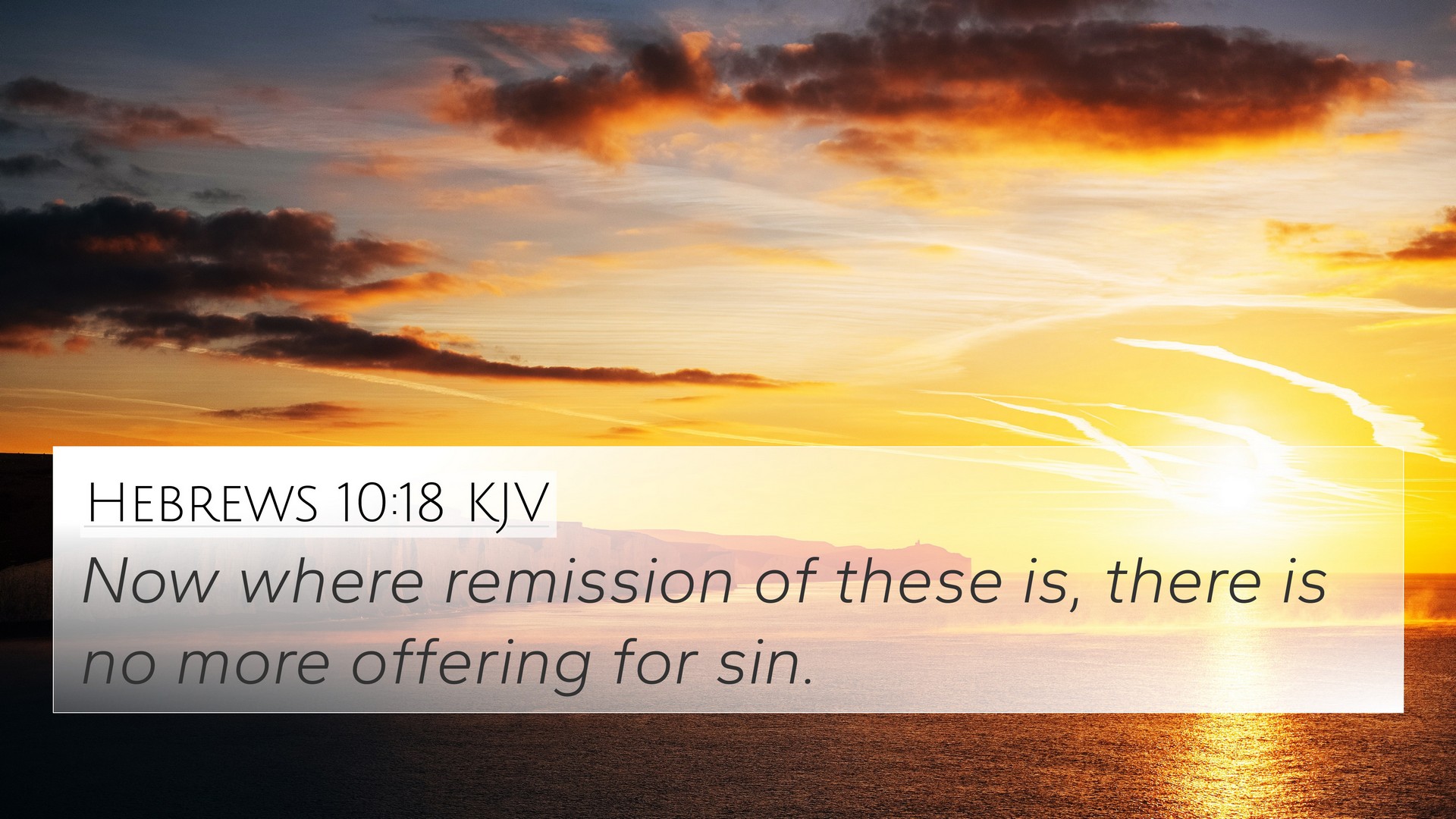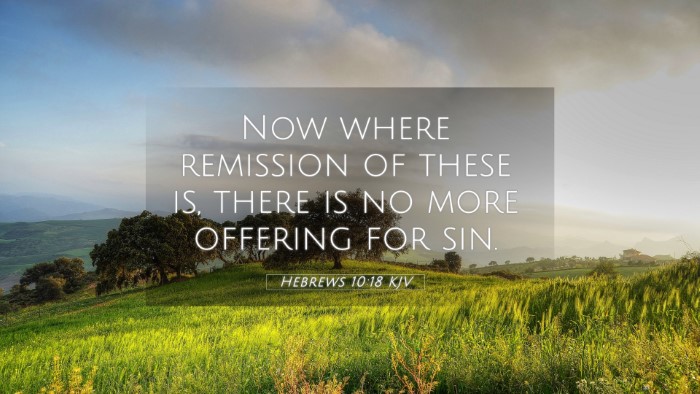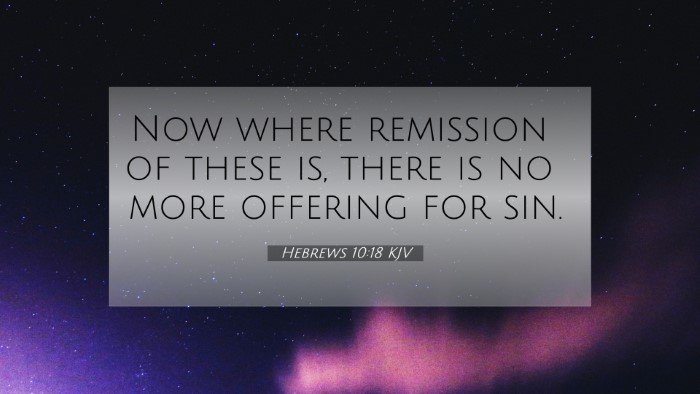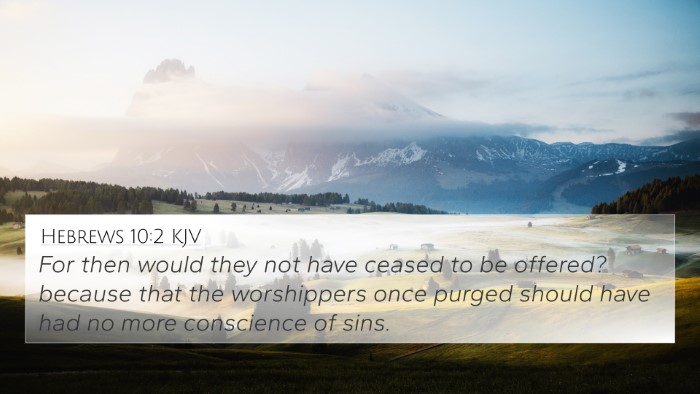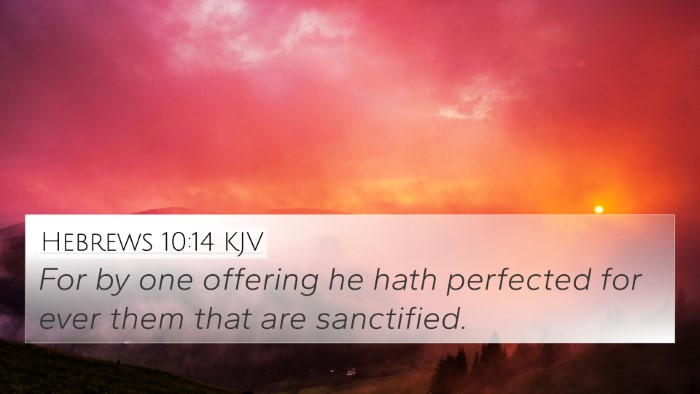Understanding Hebrews 10:18
Hebrews 10:18 states:
"Now where there is forgiveness of these, there is no longer any offering for sin."
This verse captures a profound theological truth about the finality of Christ's sacrifice and the sufficiency of His atoning work. Drawing from various public domain commentaries, we can summarize its meaning as follows:
- Matthew Henry Commentary: Matthew Henry emphasizes that the verse assures believers of the complete forgiveness granted through Christ. He highlights that once sin is forgiven, no further sacrifices are necessary, marking a significant transition from the Old Covenant to the New Covenant. Believers should rejoice in the fact that Christ's single sacrifice suffices for all demands of the law.
- Albert Barnes Notes: Albert Barnes remarks that this declaration signifies the end of the priestly sacrifices previously practiced. He points out that the priests could continually offer sacrifices, but they could never fully take away sins. In contrast, the perfect sacrifice of Christ has secured eternal redemption, indicating that any further offerings would doubly emphasize the inadequacy of previous ones and diminish the sufficiency of Christ's atoning work.
- Adam Clarke Commentary: Adam Clarke also supports the notion of finality in Christ's sacrifice. He indicates that the Jewish believers, to whom Hebrews was written, needed to understand the shift from the old sacrificial system. Clarke emphasizes that since God has granted forgiveness, there is no longer a necessity for offerings, which was a familiar practice in the Jewish faith.
Bible Cross-References:
- Hebrews 9:22: "And according to the law, almost all things are purified with blood, and without shedding of blood there is no remission." This speaks to the necessity of bloodshed for forgiveness.
- Romans 8:1: "There is therefore now no condemnation for those who are in Christ Jesus." This verse highlights the freedom from guilt through Christ.
- 1 John 1:7: "But if we walk in the light, as he is in the light, we have fellowship with one another, and the blood of Jesus Christ his Son cleanses us from all sin." This underlines the continuous cleansing power of Christ's blood.
- Colossians 2:14: "Having wiped out the handwriting of requirements that was against us, which was contrary to us. And He has taken it out of the way, having nailed it to the cross." This suggests that the record of our sins has been rendered void through Christ.
- Hebrews 7:27: "Who does not need daily, like those high priests, to offer up sacrifices, first for his own sins and then for the people's, for this He did once for all when He offered up Himself." This emphasizes the unique and singular sacrifice of Christ as sufficient.
- Isaiah 43:25: "I, even I, am He who blots out your transgressions for My own sake; And I will not remember your sins." This reinforces God's promise of forgiveness.
- John 1:29: "The next day John saw Jesus coming toward him, and said, 'Behold! The Lamb of God who takes away the sin of the world!'" This attributes the act of taking away sins directly to Jesus.
Thematic Connections:
- Understanding the sacrificial system in the Old Testament and its fulfillment in Christ.
- The role of faith and belief in receiving forgiveness.
- The essence of grace and the unmerited favor given to believers.
- Contrasting the Old Covenant (laws and sacrifices) with the New Covenant (grace through faith in Christ).
Links to Other Scriptures:
Hebrews 10:18 is intricately connected to many other scriptures that speak about the nature of sin, forgiveness, and redemption:
- Galatians 3:13 - Explains how Christ redeemed us from the curse of the law.
- Romans 3:23-26 - Discusses all have sinned and are justified freely by His grace.
- Revelation 1:5 - "And from Jesus Christ, the faithful witness, the firstborn from the dead, and the ruler over the kings of the earth. To Him who loved us and washed us from our sins in His own blood." This underscores Christ's redeeming work.
This understanding shapes the believer's life, showing how critical it is to appreciate the depth of Christ's sacrifice and the assurance that comes with complete forgiveness. For believers, Hebrews 10:18 serves as a foundational verse reminding them of the significant transition from the old sacrificial system to the new life of grace available through Jesus Christ.
Conclusion:
In summary, Hebrews 10:18 conveys that through Christ's sacrifice, there is complete forgiveness for sin, eliminating the need for further sacrifice. This principle is echoed in various other scriptures, enriching our understanding and providing strong support for the message of grace and redemption in Christ.
